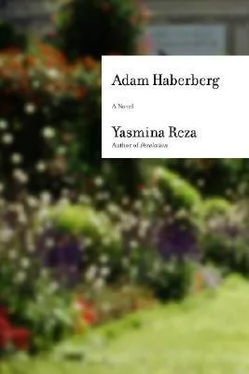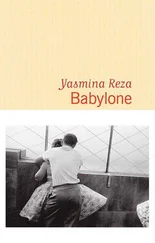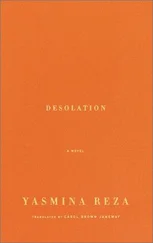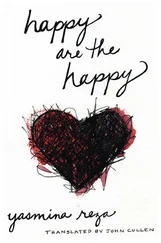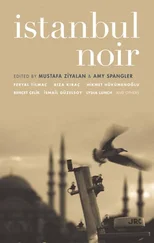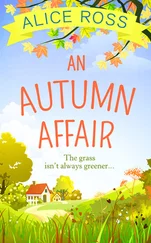“Am I laughing?”
“Yes. We're here.”
They've stopped in a little parking lot. The turn she's just made into the almost empty site suggests there's a space she always homes in on.
“Over there you have the Viry-Châtillon lake. It's very well known. People water-ski and sail there.
There are ducks, swans.”
“Do you water-ski?”
“No. I tried one year at Banyuls, I could never get started. That's where I live.”
Marie-Thérèse points to a low, terraced apartment block that resembles certain vacation homes. There's not much around it, apart from a crane in front of a building under construction and another block set farther back. No more rain and fog. No more floating lights. No more warmth.
“Marie-Thérèse, take me back to Paris.”
“Why, for goodness' sake?”
“Please.”
“You're going to eat first, then we'll see. Come along.”
Marie-Thérèse gets out of the car. Adam as well. Marie-Thérèse locks the doors. She says, “That's Grigny over there.”
“I see.”
“That's the public housing at Grande Borne.”
“I see.”
They stare at an illuminated hillside in the distance. Adam takes a few steps toward the lake. Marie-Thérèse follows him. Then they stop. After a moment Marie-Thérèse says, the area on the Grigny side is not so well looked after, they don't prune the trees, there are McDonald's wrappers. Adam nods. In silence they contemplate the low trees, the little hedges, the motionless water, the birds slipping along in the half-light. They contemplate the lampposts, the low-rise housing zone, the restaurant on the far shore. Marie-Thérèse is contemplating what she sees every day and every night. She's lost her energy, thinks Adam. He sees her in the bleak light, at last he can see her face, a somewhat sunken mouth, dark veins, nothing serious, just the passing of youth. Right, shall we go in? says Marie-Thérèse.
“So what's it like, that restaurant?”
“It's a restaurant.”
“Do you go there sometimes?”
“No.”
“Why?”
Marie-Thérèse shrugs her shoulders. Adam looks at the restaurant on the far shore. A white building with a green sign, the same green as the ankle boot, he thinks, and a balcony. Suppose we go there, he says.
“Oh no,” she laughs.
“Why?”
“We haven't come here to go to a restaurant!”
“Why not?”
“I'm not going to a restaurant just down the road from me. If I go to a restaurant I go in Paris or somewhere else.”
“But I'd very much like to go to that one.”
“You'd be disappointed.”
“Really?”
“It's dreary. And not very good.”
“I see.”
“And there's no one there in the evening.”
“Oh,” he says, staring at the tranquil building beside the water and thinking about the sad and childish and inexplicable desire to go out to a restaurant. One day when they were driving down south, at the start of Irene, he remembers, very long ago, they'd crossed deep valleys and reached a village on a hillside. The village was called Glandieu. At one end of a promenade of compacted earth there was a turn that vanished beneath a rock and at this spot there was a little restaurant. They'd sat down at a table outside and he'd said to himself, he remembers, I'm going to eat a good country terrine here and drink rough wine. I'll eat gherkins beneath a summer sun, while holding Irene's hand under the tablecloth. Can you hear the seagulls, can you see them? says Marie-Thérèse.
“I can see them.”
At Saint-Vaast-la-Hougue he'd refused to rent bicycles. He recalls this stubbornness. Why had he refused to rent bicycles? The other families were cycling merrily along with the seagulls all around them. Fathers in shorts, mothers with knapsacks, cycling along amid the salt breezes and the cries of the gulls. What does this resistance signify? What ails a man who's afraid to rent bicycles? Yes, I can see the seagulls, Marie-Thérèse, and, though I don't understand what on earth they're doing in Viry-Châtillon, I can see them flying over this path for Sunday strollers and swooping down to the dull waters, I can see the lake, too, he thinks. I can see the lights of the life all around, Marie-Thérèse's summer house and Marie-Thérèse too, her coat, her scarf, her face of thirty years ago, I can see time has passed, I can see our old age under the white light of the street lamp, and when I don't want to look at anything and close my eyes I can see a piked shoe. At first, Doctor, I thought it was a car, you know, one of the long American ones. But now I remember those men in baggy trousers and long shoes on the squares in front of churches in my children's encyclopedia, I can see this teasing fluorescent green harbinger of death and it makes me think of our ancestors, I can understand all that, Doctor, I can picture all that, I can tell myself these are fragments of existence that I'm picturing, these are fragments of the universe I'm grasping, I can make links between the lake and the shadowy seagulls and the ducks, the restaurant and the curtains, I can imagine who lives up there in the housing development at Grigny, I can link my life and that of Marie-Thérèse, I can recall our life in Suresnes and imagine time as a climb up an immense, grievous, fatal staircase. My children, I can see them, too, in our apartment, I know what they're doing and I see their pajama-clad bodies. My wife, Irene, I can see too, even if I know nothing of her life. Even if I know nothing of her life. For I no longer know who she is and she doesn't know who I am. There are people I see three times a year whom I know better and who understand me better. When we go out she laughs, she goes into raptures, she takes umbrage, I simply don't understand this public animation, she never gives me secret looks — or only to reproach me for my absence — she never glances my way to convey one of those sweet, unspoken messages, I don't exist. She cheerfully makes jokes about us. The scientist and the poet, she dines out on that in company, her coarse banter disguises a gruesome pairing that she hasn't believed in for centuries, but without ever looking at me, I mean really looking at me and perceiving the extent to which this charade is painful to me. When we visit a place she makes idiotic comments in a voice that sets my teeth on edge, cultural observations she considers relevant that have no bearing on the actual facts of the case, in ringing tones that shatter the atmosphere, and if I say to her don't talk so loud or tell me later, or I don't give a damn, Irene, she gets on her high horse and falls into a silence so terrible there's no place else to go except the darkness of the crypt. I can see the book I shall never write, my unfulfilled dreams, I can see them, yes, Doctor, my unfulfilled dreams are like an archipelago within me, I can still just make it out, even though it's receding and its colors are fading, and it grows heavier and heavier within my body. I brought off The Black Prince of Mea-Hor because it's set outside the world, I can't picture the world. I can see only scattered fragments, shards, I can make no sense of it. I'm not capable of renting bicycles for my family because I'm simply not capable of grappling with the idea of joy , pedaling along amid the idea of joy kills me. Whistling along amid salt breezes with happy families is beyond my strength. If I get onto a bicycle with the little one on the saddle behind, what'll overcome me is the desire to weep. To avoid having the desire to weep, one would need to have made a success of everything else, to feel oneself in one camp or the other. Whistling along in single file with your wife and children amid the salt breezes is not the least you can do, it's the ultimate achievement. Yes, Marie-Thérèse, I can see the seagulls, they come from a long way off, tumbling over the little dunes and headlands. I can see them.
Читать дальше
